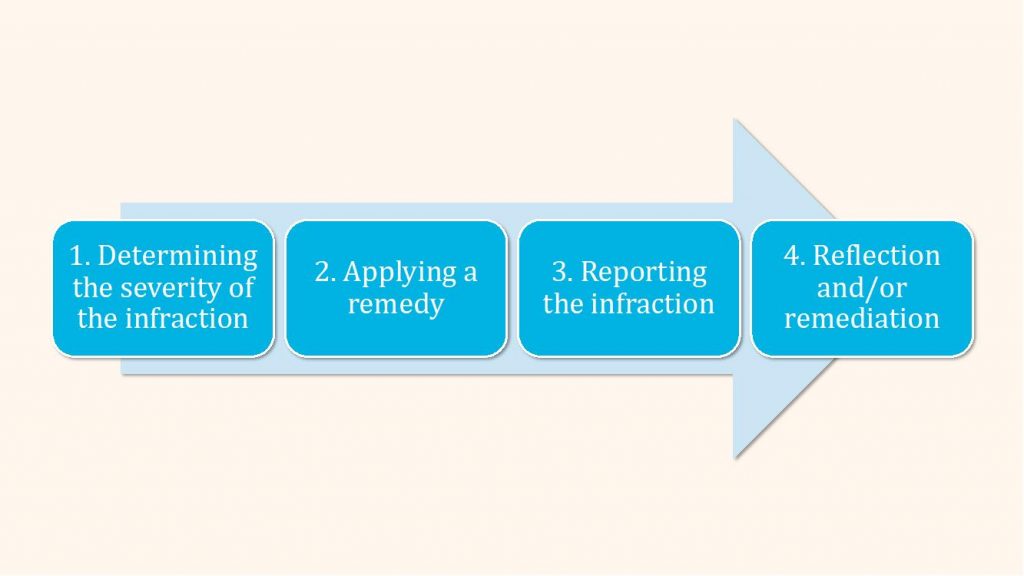Centre for Teaching Excellence
Teach | Academic IntegrityResponse
If after your investigation (gathering evidence and meeting with the student), based on the balance of probabilities, you determine that an academic integrity infraction has occurred, the response includes:

1. Determining the severity of the infraction
An incidence of academic misconduct may be deemed to be Tier 1, Tier 2, or Tier 3. The instructor makes the determination based on the evidence and meeting with the student/s.
From the S2017-05 Academic Integrity Policy and S2017-05 Academic Integrity Procedure:
| Tier One | Tier Two | Tier Three |
| Mistakes a Student may make in the process of their learning of academic conventions. | Any academic misconduct that significantly impacts the integrity of the assignment in which the misconduct occurred. | Any repeated Tier‐2 breach or any academic misconduct the impact of which extends beyond the assignment, and impacts the integrity of the whole course/program. |
| E.g, Minor cases of plagiarism (i.e. work shows some attempt at citing but with formatting errors, poor paraphrasing, some errors in citations etc.) and other academic misconduct that are determined by the instructor to be genuinely unintentional (i.e. student misinterpreting/misunderstanding an instruction). | E.g., Extensive cases of intentional plagiarism (i.e. work shows no attempt at citing or referencing) and all cases of cheating/fraud/prohibited academic conduct. | E.g., Instructor finding a series of infractions in the same course by the same Student that were previously unnoticed/unreported, organizing whole class/whole campus cheating etc. |
| Remedial outcome determined by the Instructor | Remedial and/or punitive outcome determined by the Instructor | Remedial and/or punitive outcome determined by the Dean |
| Reporting not required but encouraged | Instructor reports to Student Affairs | Instructor reports to Student Affairs, Student Affairs reports to the Dean |
2. Applying a remedy
The Academic Integrity Policy S2017-05 outlines the outcomes for each Tier of academic misconduct, which may be Remedial or Punitive. The table below summarizes the outcomes available.
| Outcome |
Tier One |
Tier Two (Instructor Assigned) |
Tier Three (Dean or President Assigned) |
| Remedial – Written warning | X | X | X |
| Remedial – Educational activity | X | X | X |
| Remedial – Redo of assignment | X | X | X |
| Punitive – Reduction in grade | X | X | |
| Punitive – Letter of reprimand | X | ||
| Punitive – Involuntary withdrawal from a course/program | X | ||
| Punitive – Suspension | X | ||
| Punitive – Permanent suspension | X |
*The University reserves the right to impose outcomes other than those listed in this document if they are commensurate with the infraction. See the Policy for definitions and regulations surrounding each outcome.
3. Reporting the infraction
Tier 1 Academic Misconduct
- Inform students of the remedial outcome via their CapU email
- There is no requirement to report to Student Affairs
Tier 2 Academic Misconduct
- Within 5 business days after meeting with the student, inform students of the remedial and/or punitive outcome via their CapU email
- Report to Student Affairs, if a repeat offense – Student Affairs reports to the Dean
Tier 3 Academic Misconduct
- Report the incident to Student Affairs, who then informs the Dean
4. Reflection and/or remediation
An instance of cheating or plagiarism in a course may offer the opportunity for reflection and remediation.
Reflection – it may be worthwhile to reflect on the infraction, the evidence and the student meeting and consider whether the infraction could have been avoided or whether anything could be done to avoid this infraction from occurring in the future, e.g., educating students about academic integrity, the design of the assignment, the format of the exam.
Remediation – taking the relevant steps to prevent an infraction from occurring again may include adding preventative steps to the course, redesigning or adding assignments, reaching out to CTE for assistance or working with your Department.
Capilano University is named after Chief Joe Capilano, an important leader of the Squamish (Sḵwx̱wú7mesh) Nation of the Coast Salish people. We respectfully acknowledge that our campuses are located on the unceded sovereign Indigenous Nations of Lil’wat, xʷməθkʷəy̓əm(Musqueam), Shíshálh (Sechelt), Sḵwx̱wú7mesh(Squamish) and Səl̓ílwətaʔ/Selilwitulh (Tsleil-Waututh).
Capilano University | 2055 Purcell Way | North Vancouver | BC | Canada | V5J 3H5